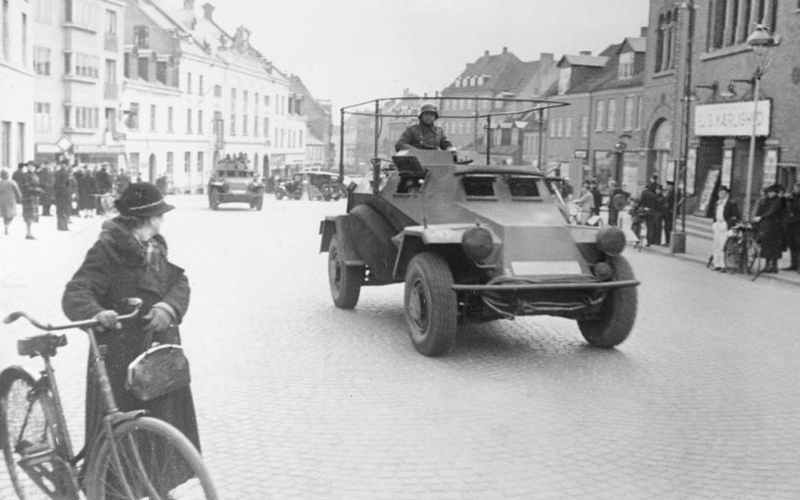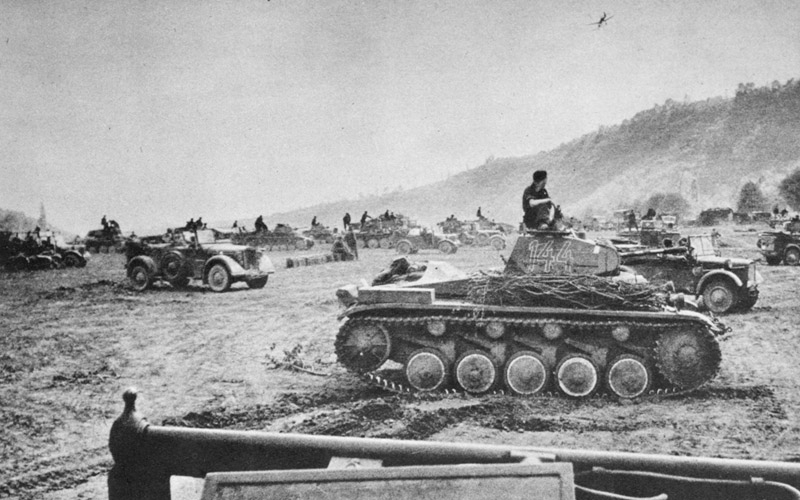
Battle of Britain
Will Britain agree to a peace settlement with Nazi Germany?
The Battle of Britain was an aerial battle which took place during the Second World War. The British Royal Air Force (RAF) defended the island of Great Britain from the Luftwaffe, the German Air Force.

1 of 6
The conflict began when the Luftwaffe initiated an air and sea blockade targeting coastal shipping convoys, ports and shipping centres, such as Portsmouth. The battle lasted several months, from July to October 1940. British historians claim that this time frame coincides with the period of large-scale German attacks. German historians maintain that the battle lasted until June 1941, when the Luftwaffe carried out its last raids into British airspace.

2 of 6
The Luftwaffe’s main objective was to obtain air superiority over the RAF, in order to incapacitate RAF Fighter Command. To this end, the Luftwaffe began to attack the RAF’s infrastructure and airports. As the battle progressed, the Germans began to attack British airplane factories and their strategic infrastructure. In time, the Luftwaffe also began a bombing campaign of civilians in Great Britain, to lower morale.

3 of 6
Due to the fact that the RAF stopped the Luftwaffe from obtaining air superiority, Adolf Hitler cancelled the Sea Lion operation. This operation had planned an amphibian and airborne invasion of Great Britain.

4 of 6
The battle is famous for receiving its name before it began, through Winston Churchill’s speech in the House of Commons after the defeat in France: “... What General Weygand has called The Battle of France is over. The battle of Britain is about to begin. Upon this battle depends the survival of Christian civilisation. Upon it depends our own British life and the long continuity of our institutions and our Empire. The whole fury and might of the enemy must very soon be turned on us. Hitler knows that he will have to break us in this island or lose the war. If we can stand up to him, all Europe may be free and the life of the world may move forward into broad, sunlit uplands. But if we fail, then the whole world, including the United States, including all that we have known and cared for, will sink into the abyss of a new Dark Age made more sinister, and perhaps more protracted, by the lights of a perverted science. Let us therefore brace ourselves to our duties, and so bear ourselves that, if the British Empire and its Commonwealth last for a thousand years, men will still say, "This was their finest hour”

5 of 6
The American president, Franklin Roosevelt, rearmed, to a degree the British army after Dunkerque. Roosevelt sent encouraging messages to Churchill through his confidant, Harry Hopkins. Roosevelt put 50 warships at the disposition of the Royal Navy and applied pressure to pass the Lend-Lease Bill. In a speech given in Charlottesville, Virginia, Roosevelt clearly stated that he would put American weaponry at the disposition of democratic countries. The Lend-Lease Bill allowed America to furnish Great Britain and later, Allied countries, with war materials.

6 of 6
The United States transferred to Great Britain the following weapons: 500,000 Lee-Enfield rifles with 129 million magazines; 895 75mm caliber cannons together with a million magazines; over 80,000 machine guns, 316 mortars, 25,000 Browning automatic rifles and 20,000 revolvers with ammunition. This transfer aided the arming of the National Guard and the members of the regular army which had returned from Dunkerque without weapons. 93 Northrop bombers and 50 Curtiss-Wright dive bombers also arrived in England. These airplanes were used to attack German warships and barges.
Immediately after Dunkerque, the UK foreign secretary Anthony Eden and the Chief of the Imperial General Staff, Sir John Dill, held a secret meeting in a hotel room in York. Superior officers of military formations billeted in northern England also participated. England’s future strategy was discussed, together with the possibility of a land invasion by the Germans.

1 of 3
The War Secretary asked if he “could count on the troops under their command, to continue fighting in any situation”. Brigadier General Charles Hudson remembered that “A murmur broke out which could almost be heard around the table. It seemed incredible to us, almost impertinence, that such a question would be addressed to us of all people.” Eden explained that, in the circumstances anticipated by the government, “it would surely be unwise to throw into battle, in a futile attempt to save a hopeless situation, people poorly armed, against an enemy well entrenched in England.”

2 of 3
The supplementary question which Eden and Dill put to the officers was: “Would our troops, if asked, embark in a northern port - let’s say Liverpool, as long as it’s still in our hands - to then be withdrawn in, say, Canada? Without such a nucleus of troops trained in their native land, the declared policy of the prime minister to continue the battle from across the ocean would be infinitely more difficult.” Hudson related that it quickly became clear that the officers were all of the same opinion, that most troops would refuse to be shipped to Canada. Thus, it became even more important to prevent a German landing.

3 of 3
The British gold reserves were transferred to Canada and evacuation plans were made for the royal family, for the Cabinet, and, in the end, for what would be left of the Royal Navy. However, it was not certain that the flower of British politics would be received with open arms by all the North-Americans. Eternally loyal Canada was a trusted ally. However, Roosevelt was a strong republican and he would not have liked for the British monarchy to establish its new headquarters in Ottawa. Churchill and Roosevelt had confrontations concerning the concept of monarchy later, during the war, touching the issue of Italy.
- David E. Fisher, A Summer Bright and Terrible, Winston Churchill, Lord Dowding,Radar, and the Impossible Triumph of the Battle of Britain, Shoemaker & Hoard, 2005
- Julia Markl, The Battle of Britain, Turning Points of World War Two, Franklin Watts, 1984
- Andrew Roberts, Furtuna războiului, O nouă istorie a celui de-al Doilea Război Mondial, Litera, București, 2013
- Gabriela Pantiș







